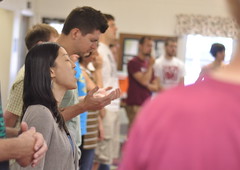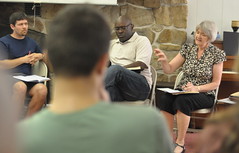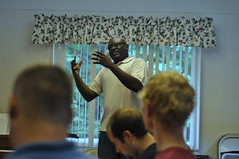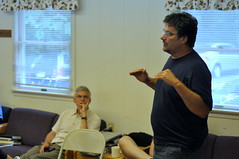crossposted from As of Yet Untitled
This weekend I was at Laurelville Retreat Center in Mt. Pleasant, Pa., participating in "Renewing the Story: Anabaptism and Mission for Today," a gathering organized by the Anabaptist Missional Project. The Mennonite had an article about this group of young adults a few months ago.
On the first evening of the gathering, founding member Matt Krabill introduced some of the history of the group. They first met together as a group in November 2009 in Harrisonburg, Va.
"We noticed that we were predominantly Anglo, male and seminary students, and that this wasn’t ideal for our goal of being a church in mission and so its something we want to change," said Kraybill, speaking of this first meeting. "We were paralyzed by the fact that we weren’t diverse, but at the same time we didn’t want to not talk."
Anabaptist Missional Project (AMP) has had two regional gatherings since then, as well in Elkhart, Ind., and Lancaster, Pa., respectively. Kraybill also shared a list of issues that have come up through those meetings.
- mass exodus of young adults from rural areas
- widespread nominalism (disaffection and driftedness)
- political polarization
- false dichotomy between peace church and missional church
- waning peace position in some/many churches
- Mennonite identity in light of "newer membership"
Krabill named the importance for the group of offering not only critique but also positive vision for the future of the church. AMP aims to have this conversation about mission from within the church rather than from outside. He also talked about the importance of leadership and Anabaptism in conversation with mission.
AMP has intentionally sought out mentors from an older generation of church leaders. Addressing those who were present, Krabill said, "We need you to speak so we can hear your wisdom and experience."
The resource people especially invited for the weekend were Leonard Dow, pastor of Oxford Circle Mennonite church in Philadelphia, and Mary Thiessen Nation, professor at Eastern Mennonite Seminary in Harrsonbug, Pa., and Palmer Seminary in Philadelphia.
Thiessen Nation spoke on the first evening about the importance of keeping all parts of Jesus life in our view. She cited David Bosch and Dietrich Bonhoeffer on the importance of focusing on the holistic Jesus: incarnation, life and teachings, passion and crucifixion, resurrection, ascension, Pentecost and parousia. She explained how focusing too much on anyone aspect can distort the way we live out our faith.
She also shared about the importance of the fellowship of suffering. She told a story of talking with someone who worked with young adults, and that person said, "We’ll lose them completely if we talk about suffering." Thiessen Nation disagreed strongly with this statement.
During the question and answer time, Thiessen Nation talked about the importance of new generations breaking out of old patterns. "You don’t have to live in reaction to legalism," she said. "As a newer generation you have the freedom to not have your agenda set in reaction to something that isn’t happening anymore."
On Sunday morning, Leonard Dow shared about some of the challenges his congregation has faced. He talked about the difference between "soft caring" of "food, fellowship and fun" and the "hard caring" that comes during times of crisis. These are the times when we need God "tabernacled" in us.
"It is through crisis that community is strengthened," Dow said.
Dow also shared some of his own story of growing up in a working class family in Philadelphia.
"I didn’t know I was poor until I went to Christopher Dock High School," he said.
He shared honestly about the challenges of crossing boundaries of race, class and culture during his time at Christopher Dock in Pa., and then at Eastern Mennonite University. Nevertheless, Dow ultimately found Mennonites to be the only church with a satisfactory theological response to violence.
In the question and answer time, Dow encouraged AMP to avoid the "silo approach" to urban ministry in which leadership of congregations does not reflect those in the pews.
"AMP needs to work with the people who have remained in the city," Dow said, "The sooner you invite the ‘remainers’ into AMP, the better, because there are people of color who are interested."
In a follow up discussion, Mauricio Chenlo, director of church planting for Mennonite Church USA said, "The barriers for white Mennonites are not theological, they are sociological and cultural barriers. The U.S. system is shaped so that you never have to cross barriers unless you want to."
Sunday afternoon was planned based on Open Space Technology in which participants choose the breakout sessions on the spot. Topics included a look at Neo-Anabapist movements, connecting missional churches and peace church and learning from past youth renewal movements such as the Young People’s Conferences.
The gathering concluded on Monday with a closing worship and communion.
I’ve obviously only been able to capture a few pieces of this gathering. If you were there and write up your response, please post the link in the comments.
Here are the other photos I took at the gathering. Click the thumbnail to see the larger version:





























Pingback: The Spirit’s Work in Mission: Prophesying about many peoples » Young Anabaptist Radicals